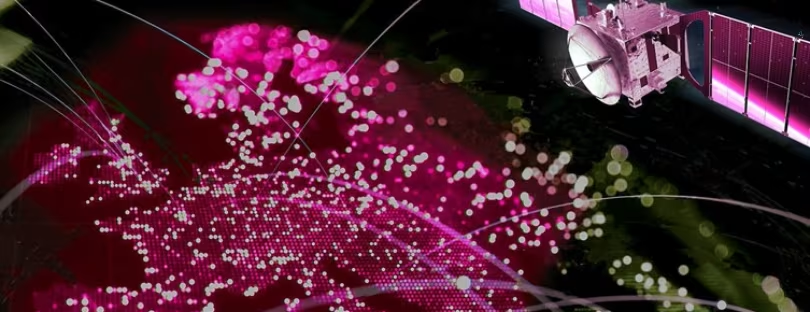
Deutsche Telekom Joins EU’s Push for Technological Sovereignty with IRIS²
With the satellite constellation IRIS2 (Infrastructure for Resilience, Interconnectivity and Security via Satellite), the European Union wants to improve Europe’s digital infrastructure with modern satellite technology. The project aims to build a powerful, secure and independent communication network. Deutsche Telekom IRIS²
Above all, however, the satellite constellation strengthens Europe’s technological sovereignty. Deutsche Telekom will support the project with its role as the leading telecommunications company in Europe.
Deutsche Telekom plans connectivity and infrastructure
Deutsche Telekom is contributing to the project with its core topics of connectivity and IT infrastructure. The object of the contract is the design of advanced IT and data center services, secure networks (WAN) and a 5G core network. Connectivity from space will enhance different domains in the future. These include, for example, surveillance, civil protection, crisis management, the protection of critical infrastructure and the issues of national security and resilience in Europe. There will also be a broadband offer for B2B customers.
“Our continent needs connectivity that is both secure and modern. With IRIS2, we achieve exactly that and strengthen Europe’s technological sovereignty. Telekom is contributing to the cross-border digital infrastructure of tomorrow, always with the focus on people,” says Claudia Nemat, Board Member for Technology & Innovation at Deutsche Telekom AG.
National Security and Advanced Satellite Connectivity
IRIS2 aims to address urgent long-term challenges in the areas of security, safety, and resilience. By providing advanced services to government users and bridging connectivity gaps across the European Union, IRIS2 underpins Europe’s strategic autonomy. In addition, the program already has the needs of the future in mind, laying the foundation for a digitalized Europe. The satellite network is intended to ensure broadband availability in rural and urban areas for both public and private users. The system will include a total of 282 satellites in different orbits. Of these, 264 satellites will be in low Earth orbit (LEO), responsible for communication services, and 18 medium-Earth orbit (MEO) satellites, which will provide global coverage and dedicated services.
Synergy of the public and commercial sectors for Europe
The SpaceRISE consortium will design, deliver, and operate the EU’s innovative, multi-orbit connectivity system IRIS2, representing a collaboration between public and private actors. This ensures that the solutions developed meet the highest standards and needs of an evolving digital landscape. The SpaceRISE consortium consists of satellite network operators SES, Eutelsat and Hispasat. In addition to Deutsche Telekom, other well-known subcontractors from several segments of the satcom ecosystem are involved. Furthermore, SpaceRISE is committed to working inclusively to welcome the most innovative European supply chain developments. Deutsche Telekom IRIS²
Conclusion
The IRIS² satellite constellation marks a strategic milestone for the European Union, securing critical infrastructure, bridging connectivity gaps, and reinforcing digital sovereignty. With Deutsche Telekom contributing its deep expertise in connectivity and IT infrastructure, IRIS² isn’t just a technological leap; it’s a unified European response to future challenges in security, resilience, and innovation.











